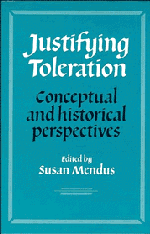Book contents
- Frontmatter
- Contents
- Preface
- Introduction
- 1 Scepticism and toleration in the seventeenth century
- 2 A more tolerant Hobbes?
- 3 Locke: toleration and the rationality of persecution
- 4 Toleration and Mill's liberty of thought and discussion
- 5 Rousseau and respect for others
- 6 The intolerable
- 7 Autonomy, toleration, and the harm principle
- 8 Friendship, truth, and politics: Hannah Arendt and toleration
- 9 Dissent, toleration, and civil rights in communism
- 10 Liberalism, marxism, and tolerance
- 11 Socialism and toleration
- Index
4 - Toleration and Mill's liberty of thought and discussion
Published online by Cambridge University Press: 20 May 2010
- Frontmatter
- Contents
- Preface
- Introduction
- 1 Scepticism and toleration in the seventeenth century
- 2 A more tolerant Hobbes?
- 3 Locke: toleration and the rationality of persecution
- 4 Toleration and Mill's liberty of thought and discussion
- 5 Rousseau and respect for others
- 6 The intolerable
- 7 Autonomy, toleration, and the harm principle
- 8 Friendship, truth, and politics: Hannah Arendt and toleration
- 9 Dissent, toleration, and civil rights in communism
- 10 Liberalism, marxism, and tolerance
- 11 Socialism and toleration
- Index
Summary
I grant that an earnest person, being no more infallible than other men, is liable to dislike people on account of opinions which do not merit dislike; but if he neither himself does them any ill office, nor connives at its being done by others, he is not intolerant: and the forbearance, which flows from a conscientious sense of the importance to mankind of the equal freedom of all opinion, is the only tolerance which is commendable, or, to the highest moral order of minds, possible.
This passage from Mill's Autobiography seems, at first glance, to be a typical and unproblematic characterisation of his views on toleration. But, on closer inspection, it seems rather to be a slip, for the ‘only commendable’, indeed ‘possible’ toleration which Mill here mentions is that of opinion. Mill is, of course, equally celebrated for his arguments concerning toleration of all manner of individual conduct in the category which he styled that of self-regarding action. Even the two spheres of liberty of opinion and self-regarding action taken together do not exhaust the types of freedom and toleration which he championed, and regarded as analytically distinct.
Perhaps Mill wished to emphasise the grounds of the forbearance shown in observing liberty of opinion; the ‘conscientious sense of the importance to mankind’ might implicitly be supposed the same as that which requires the respect and toleration shown to individual diversity.
- Type
- Chapter
- Information
- Justifying TolerationConceptual and Historical Perspectives, pp. 87 - 114Publisher: Cambridge University PressPrint publication year: 1988
- 1
- Cited by



